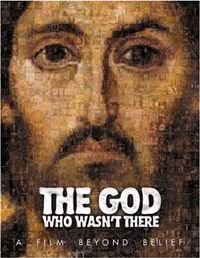The Incredible Disappearing Jesus

A Movie Review
The 2005 documentary (or perhaps more accuretly 'film essay') The God Who Wasn't There, is a 62 minute critical examination of various Christian claims by ex-fundamentalist (and chronicaler of independent film) Brian Flemming. While Flemming keeps a calm objectivist voice through most (but not all) of the film, he is clearly angery over a sense of 1) being misslead since childhood about Christianity, and 2) the evident mental distress that apperently hit him particulary hard from such teaching (a childhood fear that he was going to Hell). Flemming gets a chance to confront/vent to a figure who symbolizes those Christian forces of his childhood, this comes in the form of Dr. Ronald G. Siples, the director of the Village Christen Schools of Sun Valley California which he once attended. Siples clearly misunderstood the intent of this schedualed interview with one of his schools alumni, and after probably about 10 minutes walked out on him. That event evoked the famed Moore/Heston confrontation of Bowling for Columbine, especially given that Flemming spends the first 9/10's of his doc challenging the conventional wisdom, so that when his eventual target reiterates that CW he would look like a fool, though in the end Sipus handeld the situation fairly well.
This brings me to what Flemming actually says in the film. The directors main argument, and one you don't hear too often in American religous discourse, is that Jesus was a fictional character, an example of the mythical hero arch-type retroactively inserted into history by the writers of the Christian Gospels around 70 A.D. (or in this case I'd guess it would be C.E.). There are other relatively less controversal claims and arguments given in the film, and Flemming makes them quite well and simply with the aid of an assembly of experts, including Berkely Folkloreist Dr. Alan Dundes (who passed away shortly before the release of this film) and 'The End of Faith' author Sam Harris.
One of Flemmings big concerns is that most Christians know little or nothing about the early history of their movment, or how its foundational texts can be considerd examples of symbolic literature and parallel the mythic tales of other traditions. As a decently educated Latter-day Saint I must say I felt more preparied and less shocked by some of the information presented in the film then I'm sure many other Christians did (assuming some other Christians actully saw this film), I felt much the same way about The Da Vinci Code. There are Mormon compatable explainations or answers to many, but not all, of the issues Flemming raises in the film. I think the most difficult argument for me was his dismissal of 'moderate Christianity' (a catagory I consider myself to fall under) as making no sense. I reject the filmmakers contention that one must either take the whole Bible litearly or reject it as 'untrue', however as one who is navigating a spiritual course that has lead away in some instances from what I will call a 'face value' reading of scripture, I recognize a number of what can be called illogical leaps I've had to make, that can and perhaps should be open to criticism. The God Who Wasn't There dosen't want to let you off easy, unless maybe your an atheist.
Here is a link to a review of the film by Infidelis Maximus.

0 Comments:
Post a Comment
<< Home